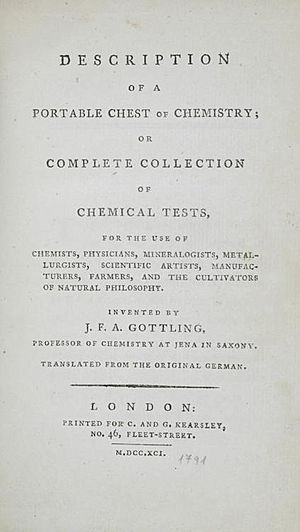Johann Friedrich August Göttling facts for kids
Quick facts for kids
Johann Friedrich August Gottling
|
|
|---|---|
| Born | 5 June 1753 Derenburg, Prussia
|
| Died | 1 September 1809 (aged 56) |
| Nationality | German |
| Scientific career | |
| Fields | Chemist |
| Doctoral advisor | Johann Christian Wiegleb |
| Doctoral students | Karl Wilhelm Gottlob Kastner |
Johann Friedrich August Göttling (born June 5, 1753 – died September 1, 1809) was an important German chemist. He made many contributions to the world of science. Göttling was known for his practical work and for teaching others.
He created and sold special chemistry kits. These kits helped people test different substances. He also researched how to get sugar from beets. This was a way to earn extra money. Göttling studied the chemistry of elements like sulfur, arsenic, phosphorus, and mercury. He wrote books about analytical chemistry. This field focuses on understanding what things are made of. He also studied how organic compounds react with nitric acid.
Göttling was one of the first scientists in Germany to support new ideas in chemistry. He disagreed with the old "phlogiston theory." Instead, he favored the modern chemistry ideas of Antoine Lavoisier. Lavoisier's ideas explained how things burn using oxygen.
Early Life and Studies
Johann Göttling began his studies in pharmacy. He learned from Johann Christian Wiegleb in Langensalza. In 1775, he started working at a special pharmacy in Weimar. This was called the Hofapotheke, or court pharmacy.
Later, in 1785, Göttling went to the University of Göttingen. There, he studied natural sciences. His hard work paid off. In 1789, a famous writer named Johann Wolfgang von Goethe helped him. Goethe arranged for Göttling to become a professor. He became an associate professor of chemistry and technology at the University of Jena. For some time, Göttling was Goethe's main source for chemical knowledge.
Teaching and Influence
Göttling was a dedicated teacher. He taught many students about chemistry. One of his notable students was Karl Wilhelm Gottlob Kastner. Göttling also helped share scientific knowledge. He was an editor for a journal called Taschenbuch für Scheidekünstler und Apotheker. This journal shared new discoveries with other chemists and pharmacists.
 | Shirley Ann Jackson |
 | Garett Morgan |
 | J. Ernest Wilkins Jr. |
 | Elijah McCoy |


